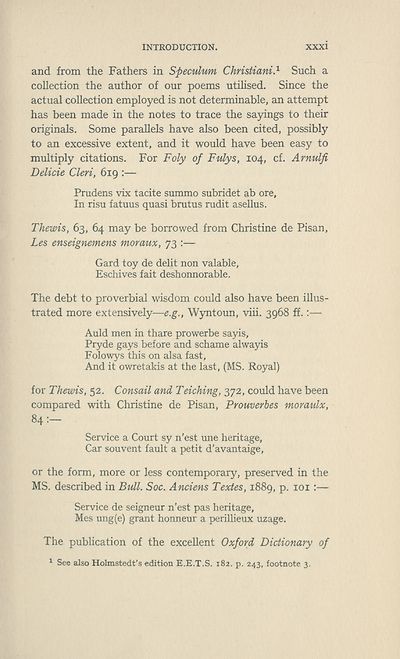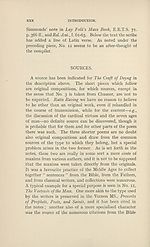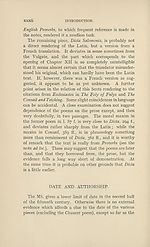Scottish Text Society publications > Third series > Ratis raving and other early Scots poems on morals
(41)
Download files
Complete book:
Individual page:
Thumbnail gallery: Grid view | List view

INTRODUCTION.
XXXI
and from the Fathers in Speculum Christiani.1 Such a
collection the author of our poems utilised. Since the
actual collection employed is not determinable, an attempt
has been made in the notes to trace the sayings to their
originals. Some parallels have also been cited, possibly
to an excessive extent, and it would have been easy to
multiply citations. For Foly of Fulys, 104, cf. Arnulfi
Delicie Cleri, 619 :—
Prudens vix tacite summo subridet ab ore,
In risu fatuus quasi brutus rudit asellus.
Thewis, 63, 64 may be borrowed from Christine de Pisan,
Les enseignemens moraux, 73 :—
Card toy de delit non valable,
Eschives fait deshonnorable.
The debt to proverbial wisdom could also have been illus¬
trated more extensively—e.g., Wyntoun, viii. 3968 ff.:—
Auld men in thare prowerbe sayis,
Pryde gays before and schame alwayis
Folowys this on alsa fast,
And it owretakis at the last, (MS. Royal)
for Thewis, 52. Consail and Teiching, 372, could have been
compared with Christine de Pisan, Prouverbes moraulx,
84:—
Service a Court sy n’est une heritage,
Car souvent fault a petit d’avantaige,
or the form, more or less contemporary, preserved in the
MS. described in Bull. Soc. Anciens Textes, 1889, p. 101
Service de seigneur n’est pas heritage,
Mes ung(e) grant honneur a perillieux uzage.
The publication of the excellent Oxford Dictionary of
1 See also Holmstedt’s edition E.E.T.S. 182. p. 243, footnote 3.
XXXI
and from the Fathers in Speculum Christiani.1 Such a
collection the author of our poems utilised. Since the
actual collection employed is not determinable, an attempt
has been made in the notes to trace the sayings to their
originals. Some parallels have also been cited, possibly
to an excessive extent, and it would have been easy to
multiply citations. For Foly of Fulys, 104, cf. Arnulfi
Delicie Cleri, 619 :—
Prudens vix tacite summo subridet ab ore,
In risu fatuus quasi brutus rudit asellus.
Thewis, 63, 64 may be borrowed from Christine de Pisan,
Les enseignemens moraux, 73 :—
Card toy de delit non valable,
Eschives fait deshonnorable.
The debt to proverbial wisdom could also have been illus¬
trated more extensively—e.g., Wyntoun, viii. 3968 ff.:—
Auld men in thare prowerbe sayis,
Pryde gays before and schame alwayis
Folowys this on alsa fast,
And it owretakis at the last, (MS. Royal)
for Thewis, 52. Consail and Teiching, 372, could have been
compared with Christine de Pisan, Prouverbes moraulx,
84:—
Service a Court sy n’est une heritage,
Car souvent fault a petit d’avantaige,
or the form, more or less contemporary, preserved in the
MS. described in Bull. Soc. Anciens Textes, 1889, p. 101
Service de seigneur n’est pas heritage,
Mes ung(e) grant honneur a perillieux uzage.
The publication of the excellent Oxford Dictionary of
1 See also Holmstedt’s edition E.E.T.S. 182. p. 243, footnote 3.
Set display mode to: Large image | Zoom image | Transcription
Images and transcriptions on this page, including medium image downloads, may be used under the Creative Commons Attribution 4.0 International Licence unless otherwise stated. ![]()
| Publications by Scottish clubs > Scottish Text Society publications > Third series > Ratis raving and other early Scots poems on morals > (41) |
|---|
| Permanent URL | https://digital.nls.uk/106919833 |
|---|
| Description | A collection of over 100 Scottish texts dating from around 1400 to 1700. Most titles are in Scots, and include editions of poetry, drama, and prose by major Scottish writers such as John Barbour, William Dunbar, Gavin Douglas, and George Buchanan. Edited by a key scholarly publisher of Scotland's literary history, and published from the late 19th century onwards by the Scottish Text Society. Available here are STS series 1-3. |
|---|

